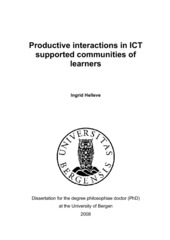| dc.contributor.author | Helleve, Ingrid | |
| dc.date.accessioned | 2011-03-02T13:30:25Z | |
| dc.date.available | 2011-03-02T13:30:25Z | |
| dc.date.issued | 2009-06-30 | eng |
| dc.identifier.isbn | 978-82-308-0833-7 (print version) | eng |
| dc.identifier.uri | https://hdl.handle.net/1956/4543 | |
| dc.description.abstract | The aim of this thesis is to single out what characterises productive interactions in ICTsupported communities of learners, based on research from three different case studies. The methodological approach through action research reflects my own learning processes as a teacher as well as a researcher (McNiff, 2002). The thesis is based on the assumption that when teachers are designing and guiding learning communities there are some common features across age-groups. Common for the three communities is that educational technology is supposed to serve as a space for collaborative writing activities. The study is conducted during a period of time from 2001 to 2004. Study 1 is carried out in 2nd grade in primary school where the students were supposed to write common texts by means of standalone- computers in the class-room. Study 2 concerns the experiences of distance learning student teachers using educational technology to give and receive feedback on written portfolios. Study 3 is based on student teachers’ experiences with implementation of ICT as a tool for written communication for campus students. In 2003 the Norwegian Research Council asked for research on what they called productive interactions defined as learning situations of high quality. Referring to the results from the ICT-supported SLANT project in England they conclude that further research within this field will bring research and practicum many steps further. The thesis is based on a socio-cultural, and situated perspective on learning, assuming that meaning is created in the tension between the learners’ different voices. Further that the computer can serve as an inter-subjective space for productive dialogues or productive interactions given some preconditions that I wanted to investigate. The term community of learners with shared responsibility for learning between teacher and students is essential for the interpretation of the case studies. Three analytical concepts are used for analysing the activities going on within the communities: Inter-subjectivity as having something in common, as a space for respectful disagreement and as human agency. Action research is the methodological approach. Through the parallel learning process; as a researcher and a teacher I have had the following focus: What can I learn for future design of new learning communities? Accordingly, one study builds on the other illustrated through a stepwise analysis. Through fieldwork I have used classroom observation, interviews and observations of oral as well as written communication. There are some general findings across the three communities. Fundamentally, the teacher should have a holistic view on the pedagogy that is going to be conducted. Pedagogy here is to be understood as the interactive process by which students learning is mediated using a range of artefacts for example language and computers. While the teacher meets the learning community with a design of activities and assignments he or she should be aware that for successful shared responsibility to take place the initial meeting seems to be crucial. There must be confidence between students and teacher, and they must work together to create the aims, the activities and the assignments that are going to be shared and solved. Another finding across the three studies is that when students are collaborating by means of the computer the teacher’s position is changed from that in an ordinary class-room. However the students still want the teacher to be present. The challenge is to figure out how? Finally I will present the findings from the three studies separately based on my observations of oral and written collaboration. I observed the students in study 1 in two different writing activities; experience and creative story. I found that if the students did not share basic confidence they developed what I called counteraction or discussional talk. This means that there was no communication at all. Either one student wrote the whole text or none of them wrote at all. Given basic confidence and interaction the conversation was dependant on what kind of assignments the students were given by the teacher. The experience story asked the students to retell what they had done in the workshops. The students were accumulating knowledge and I decided to call this conversation cumulative talk. In the creative story on the other hand the teacher read a thrilling story before she suddenly stopped and asked the students to continue. They were challenged to use their imagination through argument and creativity. I classified this kind of conversation as explorative talk which in this thesis is used as an equivalent to productive interactions or productive dialogue. What I recognized in study 2 was that the same concepts were adequate for the mutual feedback process between the student teachers. If they were asked to retell information regarding what the informative assignments asked for, then they developed cumulative feedback. If on the other hand their personal attitudes and values were challenged, as the creative assignments allowed for, they developed explorative feedback understood as productive dialogue or productive interactions. In study 3 productive interactions is understood as feedback from peers, and participation in asynchronous discussions. The study shows how and why the students experience online reflective dialogues to be qualitatively different from face-to-face collaboration. Due to distance in time and space the productive interactions are significantly different. They get more time, and they find it easier to “form” the other person. Asynchronous discussions are experienced to include more students than face-to-face discussions. Finally they find that by the end of teacher education the closed space with their written texts has grown to a “property chest” they can visit whenever they want to. | en_US |
| dc.language.iso | eng | eng |
| dc.publisher | The University of Bergen | eng |
| dc.relation.haspart | Paper I: Nordisk pedagogik 3, Helleve, I., Samspel med data?, pp. 161-170. Copyright 2003 Universitetsforlaget. Full text not available in BORA due to publisher restrictions. | eng |
| dc.relation.haspart | Paper II: European Journal of Teacher Education 30(3), Helleve, I., In an ICT-based teacher-education context: why was our group ”The magic group”?, pp. 249-267. Copyright 2007 Association for Teacher Education in Europe. Published by Taylor & Francis. Full text not available in BORA due to publisher restrictions. The published version is available at: <a href="http://dx.doi.org/10.1080/02619760701486118" target="_blank">http://dx.doi.org/10.1080/02619760701486118</a> | eng |
| dc.relation.haspart | Paper III: Helleve, I.; Krumsvik, R., If ICT is the answer- what should be the question? In: R. Krumsvik (Ed.). Learning in the network society and digitized school. New York: Nova Science Publishers, 2009. Copyright 2009 Nova Science Publishers. Full text not available in BORA due to publisher restrictions. | eng |
| dc.title | Productive interactions in ICT supported communities of learners | eng |
| dc.type | Doctoral thesis | |
| dc.rights.holder | Copyright the author. All rights reserved | |
| dc.rights.holder | The author | eng |
| dc.subject.nsi | VDP::Social science: 200::Education: 280::Other disciplines within education: 289 | eng |

